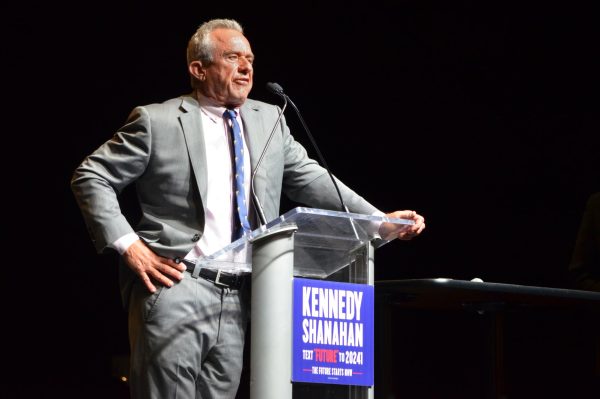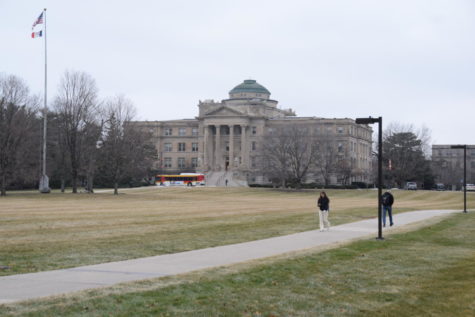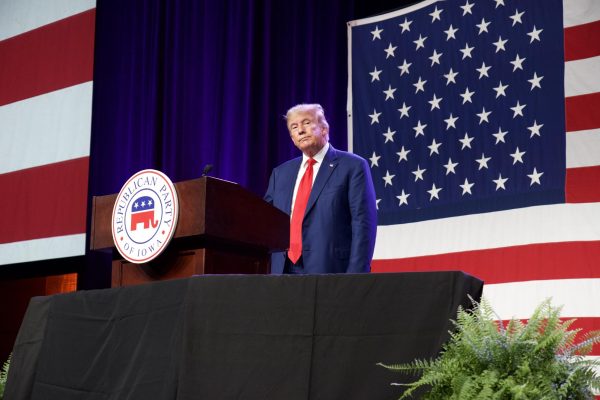GPSS Senator plans to platform graduate student concerns
Eddie Mahoney, a graduate student in computer science, is running to fill the graduate and professional student senate senate seat.
Editor’s note: Under the bolded questions are Mahoney’s direct responses.
Eddie Mahoney, a graduate student in computer science, is the current graduate and professional student senator and aims to maintain his seat through Student Government elections.
Student Government is a student organization that exists to serve and represent all students according to the student organization database. Other student organizations can apply for funding through Student Government, which according to their website, has roughly $2.6 million in annual student fee revenue to distribute.
The Student Government elections will take place March 7-8. Ballots will be emailed to students’ Iowa State email addresses.
Why do you want to return to Student Government?
“I really enjoyed my time here. I made a lot of friends; I really found kind of a place of belonging, and so from just a personal wellbeing standpoint, I love being a part of this organization. From a more impact standpoint, you know, I’ve really gotten to see the impact that Student Government does have on this campus and the amount of projects that we’re able to get done and the influence we have with administration and local government and even state federal governments.”
“A large portion of why I do want to make sure I return is that, assuming everything goes right with votes and everything, we’re gonna be operating under entirely brand new bylaws and Senate Rules of Order–so Student Government is basically going to be under entirely new procedures next year. Functionally, it won’t change that much, but a lot of things are going to be rewritten and changed, and I’m the principal author of all of them. So, part of me is wanting to make sure that we kind of iron out those kinks because I’ll be the one that kind of knows everything best in terms of our laws.”
What was your biggest accomplishment while in Student Government?
“I think the biggest accomplishment will have been, personally speaking, […] the new bylaws and Senate rules of order when they pass. That’s been an ongoing project for […] almost eight or nine months now for me personally, as well as 100 man hours by my rules committee and everybody else around me.”
“Generally speaking, I would say it’s been being speaker [of the Senate] and being able to impact and empower all of my other senators and all the other members of the organization to be as effective as they can be and really kind of be that mentor and be that kind of adviser honestly to everybody within Student Government. I think it’s been kind of my biggest personal joy–it’s honestly a large reason why I want to come back.”
What are the biggest issues facing your constituents, and how will you address them?
“We’re kind of in a unique position where we’re students obviously, but we’re also in a lot of ways teachers and employees as well, [depending on] the exact roles that you’re in […] Right now, probably the biggest singular issue is where that line actually breaks even.”
“There’s not enough benefits, to be frank, for graduate students working as TAs [teaching assistants] or working in labs, working to support other students or working to support the university’s research– they don’t get enough compensation. They don’t get enough benefits. They don’t get the same kind of protections that a normal employee would even though they’re oftentimes acting in the capacity of a full-time normal employee–and that is an ongoing problem at all three regent institutions–but I think Iowa State is particularly bad there because it’s a conversation both with the university administration and provost office and the graduate college as well as the Board of Regents and the state legislature.”
“So, it’s continuing to lift up that problem to the administration, continuing to make that a priority for the student body president and vice president so that they can continue to pass that on to our legislative ambassadors and sort of working through the channels that we have within Student Government to make that sort of impact and make those concerns heard to the right people that can actually impact them.”
What are your qualifications for being a Senator?
“So, over the years, I have been a member of IRHA [Inter-Residence Hall Association] parliament for two years. I’ve been the director of leadership for […] the Inter-Residence Hall Association. I was a member of Tau Kappa Epsilon for a number of years and part of different leadership positions within Tau Kappa Epsilon. I’ve been a member of different hall councils: I was the treasurer for computer science Software Engineering Club, I’ve been a residence hall senator [and] I’m now going to be a GPSS [Graduate and Professional Student Senate] senator already for a year. I’m the speaker of Student Government Senate completely, so I’m one of the principle leaders of the entire organization on par with the student body president.”
Why should students vote for you?
“I’ve been within Student Government before. I’m currently serving as speaker of the Senate. There are only two or three people that know Student Government better than I do and know kind of the ins and outs– know how to work the university bureaucracy to kind of get what you want and try to really maximize the impact that you can have as an individual and the students. And, generally, I think I’m dedicated.”
“I am going to be the most experienced senator, presuming I get elected, and have a large hand in what Student Government looks like next year and kind of be the institutional knowledge that sometimes gets lost over time. You know, we’re making a lot of steps to correct that, but I think there just isn’t many more people more experienced than me and more dedicated than I am.”
Your donation will support the student journalists of the Iowa State Daily. Your contribution will allow us to purchase equipment, send our student journalists to conferences and off-set their cost of living so they can continue to do best-in-the-nation work at the Iowa State Daily.











